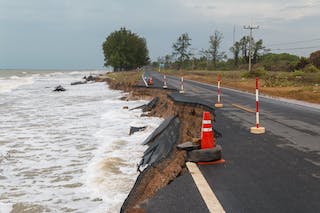This webinar was originally held on October 26, 2023 and is now available for on demand viewing.
Duration: 1 Hour
Sponsor: Esri
Already Registered? Please click here to log in and view the recording.
Summary
As the Federal Highway Administration highlighted, “Global climate change’s potential impacts on infrastructure create some of the most significant and challenging issues facing transportation planners and asset managers today.” At the same time, there is wide consensus that geographic information system (GIS) technology provides a foundation for much of the analytical work in understanding these impacts.
This webinar will highlight:
- Ready to use data sources.
- Geospatial methodologies.
- Effective communication tools for policy makers.
- Best planning practices for preparing and managing weather disruptions.
Speakers
 |
Terry C. Bills Global Transportation Industry Director Esri |
Terry Bills is the Transportation Industry Director at Esri. He has over 30 years of experience in transportation planning and policy, information technology and GIS. Terry has been with Esri for 18 years, where he provides subject matter expertise and thought leadership in transportation.
 |
Chris Dorney Vice President (Climate, Resilience, & Sustainability) WSP |
Christopher Dorney is a Vice President in WSP’s Climate, Resilience, and Sustainability practice who has been engaged in extreme weather and climate change adaptation planning for over a decade. Over this time, Mr. Dorney has been involved in several adaptation projects involving work at both the systems level and at the scale of individual facilities. Mr. Dorney has conducted many systems level climate vulnerability analyses for transportation agencies, local governments, and other institutions that drew heavily on his expertise in Geographic Information Systems (GIS) and harnessed the engineering and climate science knowledge of his colleagues. These analyses have allowed agencies/institutions to understand their vulnerabilities/risks to climate change and extreme weather and to start prioritizing adaptive actions. Mr. Dorney has also been at the forefront of developing and implementing procedures for incorporating climate change adaptation into the project development process at individual facilities and has helped incorporate the use of climate risk into benefit-cost analyses.
 |
Kristoffer Langlie District Water Resources Engineer Minnesota Department of Transportation (MnDOT) |
Kristoffer Langlie is a District Water Resources Engineer in the Minnesota Department of Transportation (MnDOT). He manages a team of individuals that design and maintain the hydraulic drainage system for MnDOT in District 6 (Southeast MN). In his 10+ years with MnDOT, he has helped advance the topic of Climate Resiliency for hydraulic assets in the State by serving as a technical advisor on several research projects and working to guide these developments into practice. He is a strong advocate of check storms to understand vulnerability, armoring to improve resiliency, and soil health practices (ag and urban) to address the challenge of increasing frequency and intensity of extreme storms. Prior to joining MnDOT, he served as Water Resources/Environmental Engineer with Liesch Associates primarily working to assess and mitigate impacts to water resources in the aviation, landfill, and mining industries.

